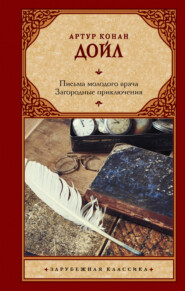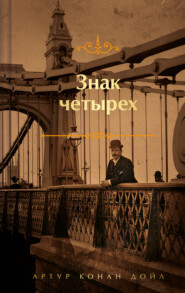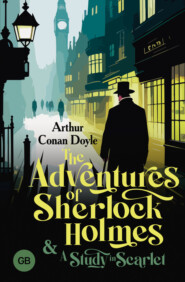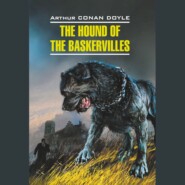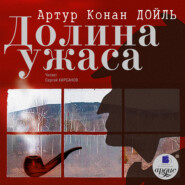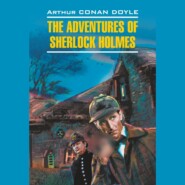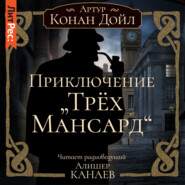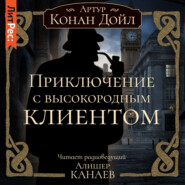По всем вопросам обращайтесь на: info@litportal.ru
(©) 2003-2024.
✖
The Great Shadow and Other Napoleon
Настройки чтения
Размер шрифта
Высота строк
Поля
You know what the border peel castles are like, I have no doubt. They were just square heaps built every here and there along the line, so that the folk might have some place of protection against raiders and mosstroopers. When Percy and his men were over the Marches, then the people would drive some of their cattle into the yard of the tower, shut up the big gate, and light a fire in the brazier at the top, which would be answered by all the other Peel towers, until the lights would go twinkling up to the Lammermuir Hills, and so carry the news on to the Pentlands and to Edinburgh. But now, of course, all these old keeps were warped and crumbling, and made fine nesting places for the wild birds. Many a good egg have I had for my collection out of the Corriemuir Peel Tower.
One day I had been a very long walk, away over to leave a message at the Laidlaw Armstrongs, who live two miles on this side of Ayton. About five o'clock, just before the sun set, I found myself on the brae path with the gable end of West Inch peeping up in front of me and the old Peel tower lying on my left. I turned my eyes on the keep, for it looked so fine with the flush of the level sun beating full upon it and the blue sea stretching out behind; and as I stared, I suddenly saw the face of a man twinkle for a moment in one of the holes in the wall.
Well I stood and wondered over this, for what could anybody be doing in such a place now that it was too early for the nesting season? It was so queer that I was determined to come to the bottom of it; so, tired as I was, I turned my shoulder on home, and walked swiftly towards the tower. The grass stretches right up to the very base of the wall, and my feet made little noise until I reached the crumbling arch where the old gate used to be. I peeped through, and there was Bonaventure de Lapp standing inside the keep, and peeping out through the very hole at which I had seen his face. He was turned half away from me, and it was clear that he had not seen me at all, for he was staring with all his eyes over in the direction of West Inch. As I advanced my foot rattled the rubble that lay in the gateway, and he turned round with a start and faced me.
He was not a man whom you could put out of countenance, and his face changed no more than if he had been expecting me there for a twelvemonth; but there was something in his eyes which let me know that he would have paid a good price to have me back on the brae path again.
"Hullo!" said I, "what are you doing here?"
"I may ask you that," said he.
"I came up because I saw your face at the window."
"And I because, as you may well have observed, I have very much interest for all that has to do with the military, and, of course, castles are among them. You will excuse me for one moment, my dear Jack."
And he stepped out suddenly through the hole in the wall, so as to be out of my sight.
But I was very much too curious to excuse him so easily. I shifted my ground swiftly to see what it was that he was after. He was standing outside, and waving his hand frantically, as in a signal.
"What are you doing?" I cried; and then, running out to his side, I looked across the moors to see whom he was beckoning to.
"You go too far, sir," said he, angrily; "I didn't thought you would have gone so far. A gentleman has the freedom to act as he choose without your being the spy upon him. If we are to be friends, you must not interfere in my affairs."
"I don't like these secret doings," said I, "and my father would not like them either."
"Your father can speak for himself, and there is no secret," said he, curtly. "It is you with your imaginings that make a secret. Ta, ta, ta! I have no patience with such foolishness."
And without as much as a nod, he turned his back upon me, and started walking swiftly to West Inch.
Well, I followed him, and in the worst of tempers; for I had a feeling that there was some mischief in the wind, and yet I could not for the life of me think what it all meant. Again I found myself puzzling over the whole mystery of this man's coming, and of his long residence among us. And whom could he have expected to meet at the Peel Tower? Was the fellow a spy, and was it some brother spy who came to speak with him there? But that was absurd. What could there be to spy about in Berwickshire? And besides, Major Elliott knew all about him, and he would not show him such respect if there were anything amiss.
I had just got as far as this in my thoughts when I heard a cheery hail, and there was the Major himself coming down the hill from his house, with his big bulldog Bounder held in leash. This dog was a savage creature, and had caused more than one accident on the countryside; but the Major was very fond of it, and would never go out without it, though he kept it tied with a good thick thong of leather. Well, just as I was looking at the Major, waiting for him to come up, he stumbled with his lame leg over a branch of gorse, and in recovering himself he let go his hold of the leash, and in an instant there was the beast of a dog flying down the hillside in my direction.
I did not like it, I can tell you; for there was neither stick nor stone about, and I knew that the brute was dangerous. The Major was shrieking to it from behind, and I think that the creature thought that he was hallooing it on, so furiously did it rush. But I knew its name, and I thought that maybe that might give me the privileges of acquaintanceship; so as it came at me with bristling hair and its nose screwed back between its two red eyes, I cried out "Bounder! Bounder!" at the pitch of my lungs. It had its effect, for the beast passed me with a snarl, and flew along the path on the traces of Bonaventure de Lapp.
He turned at the shouting, and seemed to take in the whole thing at a glance; but he strolled along as slowly as ever. My heart was in my mouth for him, for the dog had never seen him before; and I ran as fast as my feet would carry me to drag it away from him. But somehow, as it bounded up and saw the twittering finger and thumb which de Lapp held out behind him, its fury died suddenly away, and we saw it wagging its thumb of a tail and clawing at his knee.
"Your dog then, Major?" said he, as its owner came hobbling up. "Ah, it is a fine beast – a fine, pretty thing!"
The Major was blowing hard, for he had covered the ground nearly as fast as I.
"I was afraid lest he might have hurt you," he panted.
"Ta, ta, ta!" cried de Lapp. "He is a pretty, gentle thing; I always love the dogs. But I am glad that I have met you, Major; for here is this young gentleman, to whom I owe very much, who has begun to think that I am a spy. Is it not so, Jack?"
I was so taken aback by his words that I could not lay my tongue to an answer, but coloured up and looked askance, like the awkward country lad that I was.
"You know me, Major," said de Lapp, "and I am sure that you will tell him that this could not be."
"No, no, Jack! Certainly not! certainly not!" cried the Major.
"Thank you," said de Lapp. "You know me, and you do me justice. And yourself, I hope that your knee is better, and that you will soon have your regiment given you."
"I am well enough," answered the Major; "but they will never give me a place unless there is war, and there will be no more war in my time."
"Oh, you think that!" said de Lapp with a smile. "Well, nous verrons! We shall see, my friend!"
He whisked off his hat, and turning briskly he walked off in the direction of West Inch. The Major stood looking after him with thoughtful eyes, and then asked me what it was that had made me think that he was a spy. When I told him he said nothing, but he shook his head, and looked like a man who was ill at ease in his mind.
Chapter VIII – The coming of the cutter
I never felt quite the same to our lodger after that little business at the Peel Castle. It was always in my mind that he was holding a secret from me – indeed, that he was all a secret together, seeing that he always hung a veil over his past. And when by chance that veil was for an instant whisked away, we always caught just a glimpse of something bloody and violent and dreadful upon the other side. The very look of his body was terrible. I bathed with him once in the summer, and I saw then that he was haggled with wounds all over. Besides seven or eight scars and slashes, his ribs on one side were all twisted out of shape, and a part of one of his calves had been torn away. He laughed in his merry way when he saw my face of wonder.
"Cossacks! Cossacks!" said he, running his hand over his scars. "And the ribs were broke by an artillery tumbril. It is very bad to have the guns pass over one. Now with cavalry it is nothing. A horse will pick its steps however fast it may go. I have been ridden over by fifteen hundred cuirassiers A and by the Russian hussars of Grodno, and I had no harm from that. But guns are very bad."
"And the calf?" I asked.
"Pouf! It is only a wolf bite," said he. "You would not think how I came by it! You will understand that my horse and I had been struck, the horse killed, and I with my ribs broken by the tumbril. Well, it was cold – oh, bitter, bitter! – the ground like iron, and no one to help the wounded, so that they froze into such shapes as would make you smile. I too felt that I was freezing, so what did I do? I took my sword, and I opened my dead horse, so well as I could, and I made space in him for me to lie, with one little hole for my mouth. Sapristi! It was warm enough there. But there was not room for the entire of me, so my feet and part of my legs stuck out. Then in the night, when I slept, there came the wolves to eat the horse, and they had a little pinch of me also, as you can see; but after that I was on guard with my pistols, and they had no more of me. There I lived, very warm and nice, for ten days."
"Ten days!" I cried. "What did you eat?"
"Why, I ate the horse. It was what you call board and lodging to me. But of course I have sense to eat the legs, and live in the body. There were many dead about who had all their water bottles, so I had all I could wish. And on the eleventh day there came a patrol of light cavalry, and all was well."
It was by such chance chats as these – hardly worth repeating in themselves – that there came light upon himself and his past. But the day was coming when we should know all; and how it came I shall try now to tell you.
The winter had been a dreary one, but with March came the first signs of spring, and for a week on end we had sunshine and winds from the south. On the 7th Jim Horscroft was to come back from Edinburgh; for though the session ended with the 1st, his examination would take him a week. Edie and I were out walking on the sea beach on the 6th, and I could talk of nothing but my old friend – for, indeed, he was the only friend of my own age that I had at that time. Edie was very silent, which was a rare thing with her; but she listened smiling to all that I had to say.
"Poor old Jim!" said she once or twice under her breath. "Poor old Jim!"
"And if he has passed," said I, "why, then of course he will put up his plate and have his own house, and we shall be losing our Edie."
I tried to make a jest of it and to speak lightly, but the words still stuck in my throat.
"Poor old Jim!" said she again, and there were tears in her eyes as she said it. "And poor old Jock!" she added, slipping her hand into mine as we walked. "You cared for me a little bit once also, didn't you, Jock? Oh, is not that a sweet little ship out yonder!"
It was a dainty cutter of about thirty tons, very swift by the rake of her masts and the lines of her bow. She was coming up from the south under jib, foresail, and mainsail; but even as we watched her all her white canvas shut suddenly in, like a kittiwake closing her wings, and we saw the splash of her anchor just under her bowsprit. She may have been rather less than a quarter of a mile from the shore – so near that I could see a tall man with a peaked cap, who stood at the quarter with a telescope to his eye, sweeping it backwards and forwards along the coast.
"What can they want here?" asked Edie.
"They are rich English from London," said I; for that was how we explained everything that was above our comprehension in the border counties. We stood for the best part of an hour watching the bonny craft, and then, as the sun was lying low on a cloudbank and there was a nip in the evening air, we turned back to West Inch.
As you come to the farmhouse from the front, you pass up a garden, with little enough in it, which leads out by a wicket-gate to the road; the same gate at which we stood on the night when the beacons were lit, the night that we saw Walter Scott ride past on his way to Edinburgh. On the right of this gate, on the garden side, was a bit of a rockery which was said to have been made by my father's mother many years before. She had fashioned it out of water-worn stones and sea shells, with mosses and ferns in the chinks. Well, as we came in through the gates my eyes fell upon this stone heap, and there was a letter stuck in a cleft stick upon the top of it. I took a step forward to see what it was, but Edie sprang in front of me, and plucking it off she thrust it into her pocket.
"That's for me," said she, laughing. But I stood looking at her with a face which drove the laugh from her lips.
"Who is it from, Edie?" I asked.
She pouted, but made no answer.






